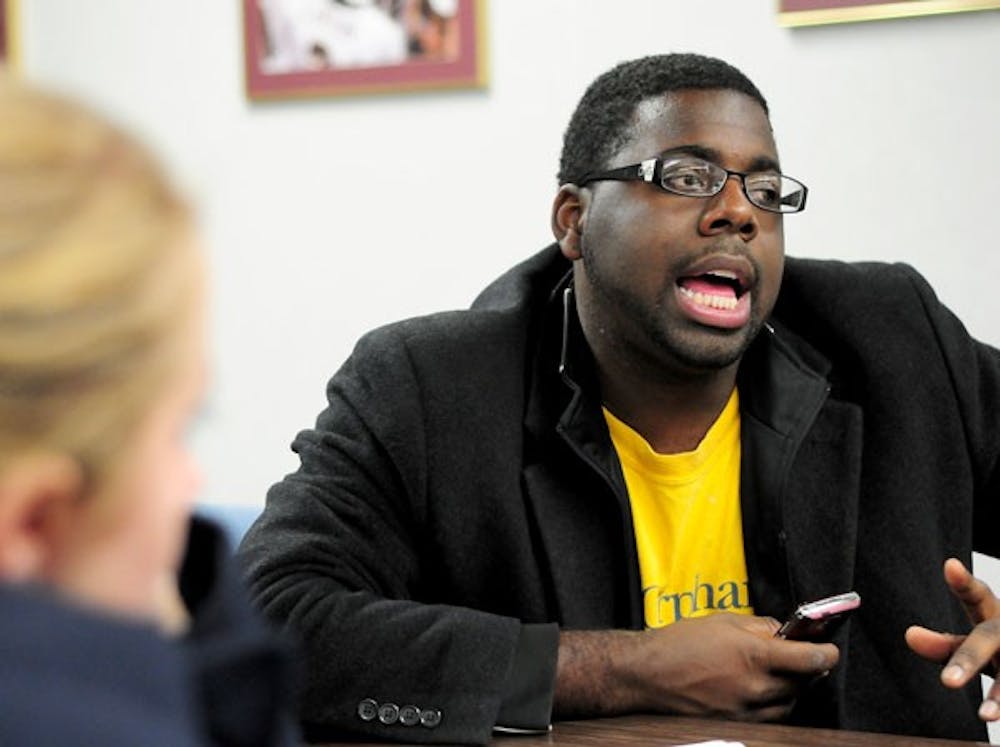Phi Beta Sigma has the largest membership in the fraternity's history

Through "culture for service and service for humanity," the brothers of Phi Beta Sigma are looking to leave a lasting mark on Central Michigan University’s campus.
Phi Beta Sigma Fraternity Inc. is a part of the “Divine Nine,” Black Greek Letter Organizations that make up the National Panhellenic Council, which oversees several multicultural Greek organizations. They were founded nationally in 1914. CMU’s chapter was founded in 1979.
The fraternity has 10 members on campus, including six new members that were added in February. The six new members mark the largest amount of recruits in the history of Phi Beta Sigma’s CMU chapter.
The chapter’s president, Romulus senior Richard Walker, joined the fraternity in spring 2013, and said he has been impacted greatly by becoming a member of the organization.
“I’ve definitely grown a lot in terms of being accountable, because when you wear letters you’re not just representing yourself, you’re representing your organization,” Walker said. “It also gave me a platform to show myself in a light where people haven’t been used to seeing me.”
During the last week of February, the Sigmas, what the fraternity goes by in the multicultural Greek community, had a week full of programs to inform and impact the community. The programs were meant to educate people and have dialogue about topics including fitness, health and social issues, like the current relationship between law enforcement and citizens.
During a program entitled “Police and Public Relations," members from various police departments came to CMU to have a discussion with students.
Fraternity member and Mount Pleasant senior Paul Barlow said the dialogue between the police and citizens was productive and well-needed. He said police and citizen relations have been on the minds of many people nationally.
“Lately there have been a lot of issues with police and the African-American community,” Barlow said. “(Students) were able to talk with them and have questions and comments about their policies, and tell how we look at things from our point of view.”
The Sigmas have one of the largest groups in the NPHC at CMU. The lower membership in multicultural fraternities are a result of the number of African-Americans on a predominantly white campus.
“At a school where NPHC isn’t as big as everybody else, it’s kind of tough to get exposure and communication out there,” Barlow said. “It’s been on the up and up nowadays because we’ve made more of an effort to reach out to the IFC and the Panhellenic Council as a committee to support each other.”
History and tradition is a major part of not just Phi Beta Sigma, but all of the organizations that are in NPHC. Most of these organizations were founded over 100 years ago during a time when blacks were denied rights and acceptance.
“The Divine Nine started with black men and women having a vision on how to improve their community, and how to bring each other along through brotherhood to accomplish bigger goals,” Walker said. “Especially in a time when a lot of people were divided and backs were against the wall considering that racism was big around that time.”
Flint junior Jordan Fields is one of four members of Phi Beta Sigma who is on the CMU football team. Being known for more than just his work on the gridiron is something Fields takes pride in.
“It’s good to see football players being more than just football players, and actually stepping out of their status quo role and being involved in the community and campus activities,” Fields said. “When people are on sports teams, they can branch out to a different community that another person may not be able to.”
Ultimately, this chapter of Phi Beta Sigma said they want to be known for the positive legacy that it leaves on campus.
“I think that we’ll be remembered as a sociable group that is always trying to help out in the community and doing what’s right,” Fields said. “We try to be good men who handle things right, and do things the right way.”




